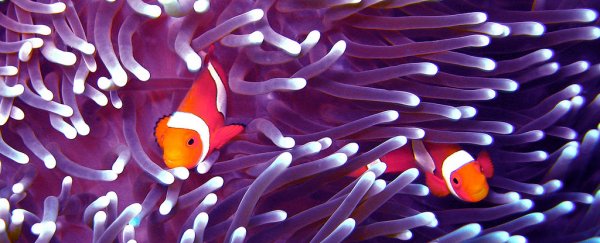As ocean temperatures rise as a result of climate change, fish are adapting in unexpected ways to give their offspring the best chance at survival.
A new study by researchers at the University of Technology, Sydney (UTS) in Australia show that reef fish that have spent their whole lives in warmer waters, can arbitrarily adjust the sex of their offspring. Interestingly, this isn't the result of genetic factors or changes in behaviour, the researchers say.
The finding is potentially good news, as it means new generations of reef fish, born into waters with slightly elevated but constant temperatures, can continue to produce an equal balance of male and female young, which will help these populations continue to survive into the future.
This is important, as the UTS:Science researchers have also shown, that very minor temperature increases during a fish's development can result in a much higher yield of male offspring, throwing sex ratios out of whack.
The team's findings, which have been reported in the journal Global Change Biology, suggest the mechanism for determining the sex of offspring is switched on in the very early development of a fish, and is not necessarily triggered by exposure to warmer water.
"Understanding the ability of species to respond and cope with rising environmental temperature is key to predicting the biological consequences of global warming," said lead author and UTS:Science marine biologist Jennifer Donelson in a press release.
"The research findings are significant because global warming poses a threat to species with temperature-dependent sex determination (TSD), such as reptiles and fish, potentially skewing the sex-ratio of offspring and, consequently, breeding individuals in a population," Donelson said.
Not all species need a sex ratio of 1:1. What's optimal for a given species depends largely in its breeding behaviour. But it's usually bad news if the sex ratio becomes massively imbalanced, particularly so if there's a dramatic decrease in the proportion of females, because population growth is largely contingent on female fertility. Basically, if there aren't enough females to mate and reproduce with, all the males of a species, and then the reproductive success of the whole population, suffers.
The UTS:Science researchers studied the Spiny Chromis, Acanthochromis polyacanthus, photographed below, which lives in coral reefs in the western Pacific Ocean, in places like Indonesia and northern Australia. They looked at multiple generations of the fish to see how they responded to varying temperature increases - both when they were born into these waters, and when they were exposed to warmer waters later in life.
The researchers showed that even relatively small increases in developmental temperatures, just 1.5 degrees Celsius above average summer temperatures, can reduce the proportion of female offspring by more than 30 percent. Interestingly, the female sex ratio was restored when the parents were reared at this temperature for their entire life.
When temperatures were increased by 3 degrees Celsius, however, the team only saw a partial improvement. This suggests "a limitation to transgenerational plasticity when the developmental temperature is too hot," Donelson said.
She says previous research has focussed on changes to the timing of breeding behaviour of mothers, such as altering their nest to compensate for warming.
"Just precisely how our study species… engineer these amazing adjustments is unknown and is something we are now investigating," she added.
Love science? Find out more about studying at UTS:Science.

